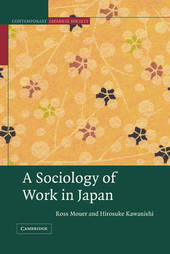
|
A Sociology of Work in Japan
Hardback
Main Details
| Title |
A Sociology of Work in Japan
|
| Authors and Contributors |
By (author) Ross Mouer
|
|
By (author) Hirosuke Kawanishi
|
| Series | Contemporary Japanese Society |
|---|
| Physical Properties |
| Format:Hardback | | Pages:324 | | Dimensions(mm): Height 236,Width 158 |
|
| ISBN/Barcode |
9780521651202
|
| Classifications | Dewey:306.360952 |
|---|
| Audience | | Professional & Vocational | | Tertiary Education (US: College) | |
|---|
| Illustrations |
56 Tables, unspecified
|
|
Publishing Details |
| Publisher |
Cambridge University Press
|
| Imprint |
Cambridge University Press
|
| Publication Date |
11 May 2005 |
| Publication Country |
United Kingdom
|
Description
What shapes the decisions of employees in Japan? The authors of this comprehensive and up-to-date survey of the relationship between work and society in Japan argue that individual decisions about work can only be understood through the broader social context. Many factors combine to affect such choices including the structuring of labour markets, social policy and, of course, global influences which have come increasingly to impinge on the organisation of work and life generally. By considering labour markets, social policy and relationships between labour and management, the book offers penetrating insights into contemporary Japanese society and glimpses of what might come in the future. Underlying the discussion is a challenge to the celebration of Japanese management practices which has dominated the literature for the last three decades. This is an important and groundbreaking book for students of sociology and economics.
Author Biography
Ross Mouer is Professor of Japanese Studies in the School of Languages, Cultures and Linguistics at Monash University. His publications include Images of Japanese Society: A Study in the Construction of Social Reality (1986 with Yoshio Sugimoto). Kawanishi Hirosuke is Professor of Sociology at Waseda University, Tokyo. He is the author and editor of many books including Enterprise Unionism in Japan (1991) and The Human Face of Industrial Conflict in Post-war Japan (1999).
Reviews"Rebick's analysis is masterfully institutional and his analysis is based on the most meticulous nalysis of primary and secondary labor data possible given the limits of data acces." - Mary C. Brinton, Harvard University
|